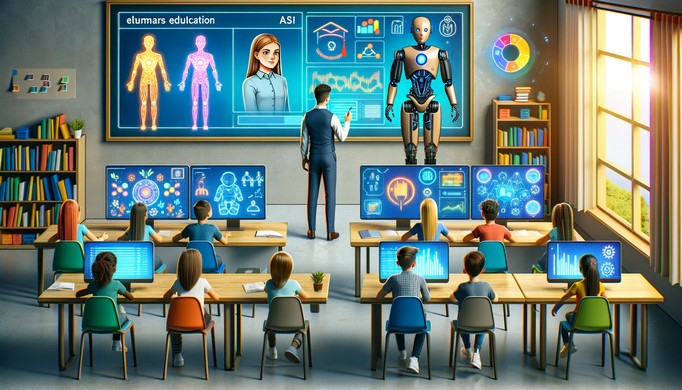The digital revolution has transformed education, with AI, VR, and AR changing the learning experience. Cutting-edge technology provide individualized, immersive, and interactive learning environments, which are changing educational paradigms. We look at how these technologies are changing the classroom and preparing students for the digital economy of the future.
How AI is changing education

How AI is changing education
The days of the conventional, one-size-fits-all educational strategy are long gone. An age of customized learning has begun with the introduction of artificial intelligence (AI) into the classroom, where AI is used to customize the curriculum to each student’s unique requirements. Every student’s learning path is as unique as they are thanks to AI’s tailored approach.
- Tailored lesson plans to meet the requirements of each unique learner
- AI-powered evaluations to monitor development
- Learning management systems that adjust based on student performance
How VR is changing education
Learners’ interactions with information are changing as a result of virtual reality. Students may travel to far-off galaxies or historical civilizations by wearing VR headsets, which makes every class an engaging, hands-on experience. Beyond the boundaries of the classroom, virtual reality education allows for deeper knowledge and the kindling of a love for learning that lasts a lifetime.
- VR-powered immersive educational experiences
- Increased involvement in interactive models
- Virtual exploration of scientific and historical surroundings
How AR is changing education
Traditional educational materials are being given new life by augmented reality, which adds an interactive element that pops off the page. Lessons become more interactive and interesting when static photos suddenly become amazing three-dimensional objects in front of the pupils. In education, augmented reality is more than just a new idea—it’s an effective tool for bridging the conceptual divide with practical comprehension.
- AR apps that make learning more dynamic and engaging
- Interactive 3D models that enhance textbook information
- Augmented reality-based gamified learning experiences
How to prepare students for the future with technology education
It is impossible to overestimate the significance of incorporating technology into education in an increasingly digital environment. Our goal is to provide students with the technical know-how and critical thinking skills necessary to successfully navigate and influence the digital world. Our educational institutions are adjusting to the rapid advancement of technology so that our graduates will be leaders in the digital era rather than just participants.
- Incorporating digital tools and platforms into curricula to foster critical thinking and digital literacy
- Initiatives that support creativity and leadership in the digital sphere
What knowledge is needed for success in a technologically-oriented economy
Data analysis, coding, and digital literacy are becoming essential skills in the digital economy. Soft talents like creativity, problem-solving, and cooperation are equally important. These skills are now necessary for success in a world where technology is as pervasive as the air we breathe. They are no longer optional.
- The importance of digital literacy as a core competency
- Prioritize mastery in coding and data analysis.
- Development of soft skills such as creativity, teamwork, and problem-solving
Job prospects for technology education graduates
For anyone starting out on a career in technological education, the future is aglow with opportunities. There are many and fascinating employment options available, ranging from data analysis to AI invention. These grads have the potential to have a big impact and change the future; they are not only looking for work.
- A wide range of opportunities for careers in developing technologies
- lucrative positions in data science and AI development
- Prospects for entrepreneurs that are tech-savvy
What professions are in high demand for technology education graduates
The rapid progress of the digital revolution has led to an increase in the need for professionals in the fields of cybersecurity, cloud computing, and AR/VR design. These sectors are at the forefront and are hungry for the knowledge of people with advanced technological education.
- Occupations in cyberspace safeguarding against online dangers
- Opportunities for infrastructure and cloud services
- Novel positions in the design and production of AR/VR content
What skills and knowledge are required to obtain a technology-related profession
In order to succeed in the fast-paced field of technology, one has to have an attitude of constant learning and flexibility. It is essential to comprehend the intricacies of user experience design, the business savvy required to sell advances, and the moral implications of artificial intelligence.
- Adaptability and lifelong learning in a changing technological environment
- Marketing and business acumen for IT entrepreneurs
- Ethical issues and appropriate technology usage
The Digital Classroom: A Discovering Journey
Enter the contemporary classroom, a haven of endless possibilities and technological enrichment. Every class is an adventure, every graduate is a potential trailblazer prepared to take on the digital world, and every student is on the verge of discovery. Welcome to the era of digital learning, when acquiring knowledge is a lifetime journey of discovery rather than only memorizing facts.
- An abundant supply of digital tools and materials in the classroom
- A curriculum that reflects the diversity and vibrancy of the pupils it teaches
- A dedication to preparing pupils for lifelong study and exploration in the digital era
Conclusion
As we approach an educational renaissance, technology is our guide across the huge ocean of information. From individualized lesson planning with AI to the limitless horizons of VR and AR, technology is the new educator, mentor, and portal to possibilities beyond the classroom. This essay has explored how technology education prepares kids for a bright and limitless future, making them active pilots in the digital era. Our learning will change with technology, guiding us toward innovation and excellence.
- Q1: How is AI changing the educational landscape for students?
A1: AI is personalizing learning by adapting to individual student’s needs, offering customized lesson plans and assessments, and facilitating a more engaging and effective learning experience.
- Q2: What role does virtual reality play in modern education?
A2: Virtual reality (VR) transforms traditional learning, allowing students to immerse themselves in historical, scientific, and geographical explorations, thus enriching their understanding and engagement.
- Q3: Why is augmented reality significant in today’s classrooms?
A3: Augmented reality (AR) brings a new dimension to learning materials, turning static images into interactive, 3D experiences that enhance comprehension and engagement.
- Q4: What skills do students need to thrive in the digital economy?
A4: Beyond coding and data analysis, students need digital literacy, critical thinking, creativity, and collaborative skills to succeed in the technology-driven job market.






